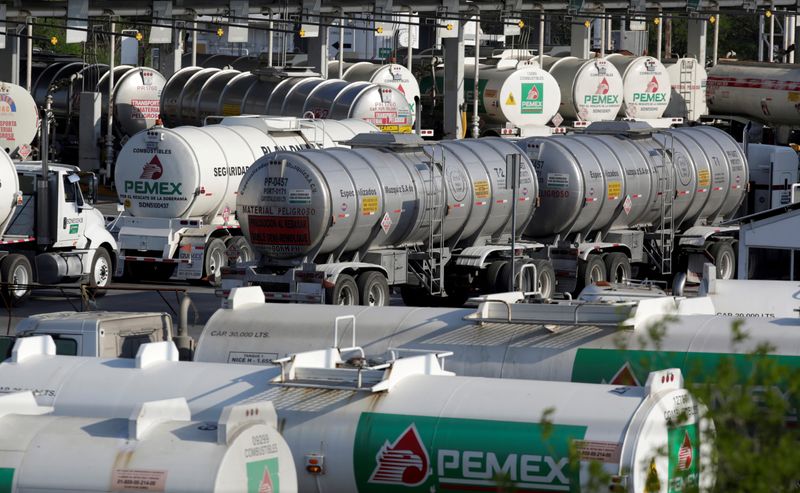By Devika Krishna Kumar and Stefanie Eschenbacher
NEW YORK/MEXICO CITY (Reuters) - Mexico will have to pay more for less coverage under its giant oil revenue insurance policy for 2021, but will likely go ahead anyway to avoid further damaging its financial standing with international investors, sources said.
The finance ministry's billion-dollar oil hedge is the world's largest. It has been a pillar of the budget for more than two decades for Mexico, which pumps about 1.7 million barrels per day of crude.
The policy ensures Mexico can sell oil at a predetermined price, guaranteeing a portion of revenues crucial for the state budget - no matter what happens in the global oil market.
Many countries dependent on oil revenues face massive budget shortfalls due to collapsing prices and demand during the coronavirus pandemic, yet Mexico's insurance policy is expected to deliver a $6 billion payout this year - its largest ever.
Bankers and officials on both sides of the secretive deal expect a smaller hedge this year since market volatility and lower crude prices have sharply hiked the cost of options Mexico typically uses to hedge oil sales. Those oil derivatives for 2021 are 40% more expensive than normal, several market sources said.
At the same time, resources available to finance the hedge are dwindling. Despite the bumper hedge payout, lower revenues have forced Mexico's government to plug the gap by spending more of the stabilization fund that also pays for the hedge.
"There are lots of challenges, and everything points to it being more difficult," said a Mexican source who worked on last year's hedge.
Finance ministry sources said internal discussions center on either hedging a smaller part of the country's exports in 2021; buying cheaper options; or using a less costly strategy.
Negotiations with banks on the hedge have yet to start, ministry and Wall Street sources said.
The hedge is designed to protect about one-fifth of Mexico's budget revenues, current and former Mexican finance and energy ministry officials said.
The finance ministry, energy ministry and the president's office did not reply to requests for comment. The government has grown more secretive about its strategy so other traders cannot easily profit from speculating on its giant options purchases with bets that can in turn make the hedge more expensive. [nL1N28C1XM]
Finance Minister Arturo Herrera is a strong proponent of the hedge and likely to keep it, said several Mexican sources familiar with his thinking.
JPMorgan Chase & Co (N:JPM), Citigroup Inc (N:C), Goldman Sachs Group Inc (N:GS), BNP Paribas SA (PA:BNPP) and Shell (L:RDSa) are among those the finance ministry tapped to execute the hedge last year, sources familiar with the deal said. [nL2N278035]
Investors and credit rating agencies consider the hedge a measure of fiscal prudence that offsets oil market volatility. Scrapping it might prompt some bond investors to demand higher yields. [nL1N2DJ00Y]
If Mexico's borrowing costs rise, it could also mean even higher financing costs for ailing state oil company Petroleos Mexicanos [PEMX.UL], already a junk-rated company. [nL1N2D32OK]
Mexico is still rated investment grade, but all three major credit rating agencies - Fitch Ratings, Moody's Investors Service and S&P Global Ratings - downgraded the country this year, and could lower its rating in coming months.
"The hedge insures federal revenues," said Luis Gonzali, a portfolio manager at Franklin Templeton, one of the world's top investors in emerging markets.
"Not having this insurance would put pressure on the country's finances, investor confidence and eventually the credit rating."
Mexico estimates its main Maya crude export will average $30 per barrel in the coming year. Brent crude (LCOc1) is expected to average about $46 in 2021, according to Reuters polling. As of Friday, Brent was trading at $38 a barrel, while Maya bound for the U.S. Gulf Coast traded at $33.37 on Thursday, according to S&P Global Platts.
MORE EXPENSIVE
Mexico typically hedges in a straightforward way: it purchases put options, which give the holder the right but not the obligation to sell at a predetermined price.
The options have been trading at higher prices due to market volatility, the main driver of those prices. With coronavirus lockdowns slamming demand in April, oil prices plunged to multi-year lows. U.S. crude actually fell into negative territory for the first time in history.
Mexico may try to save cash by buying put options at a lower level - known as a strike price. That would cost less, but such a hedge would only pay out if oil was at lower level.
In the past, when oil prices were lower, Mexico has hedged fewer barrels to offset the higher cost, said one banker who has negotiated with Mexican officials in the past.
"Without a doubt, the hedge for the coming year, if it's done, will carry much higher premiums," a source in the finance ministry said.

"In this market, it'll be complicated for the Mexican government."
